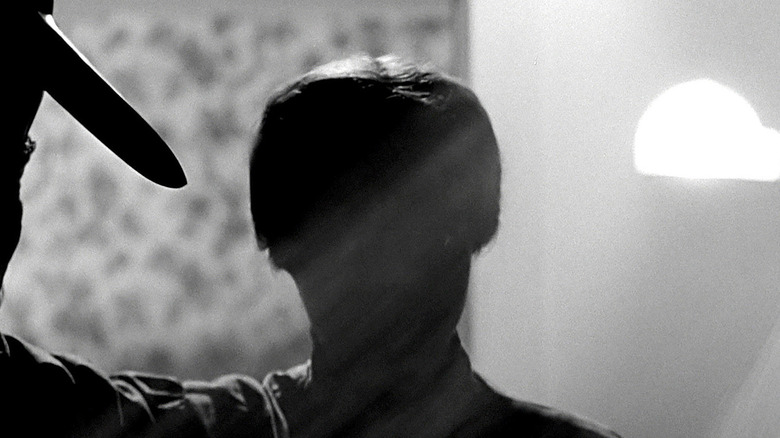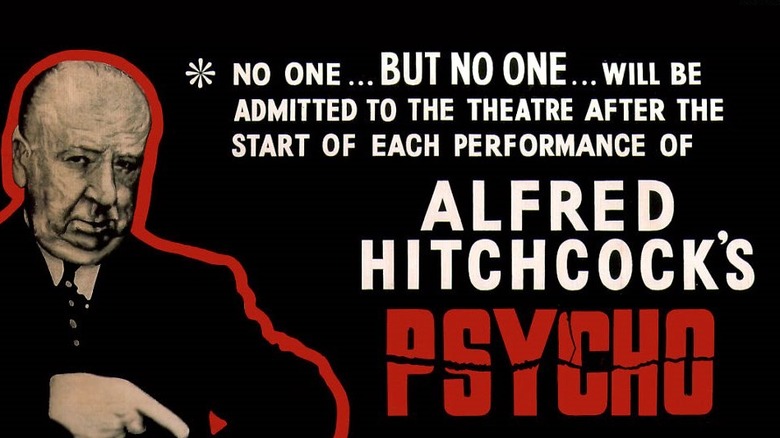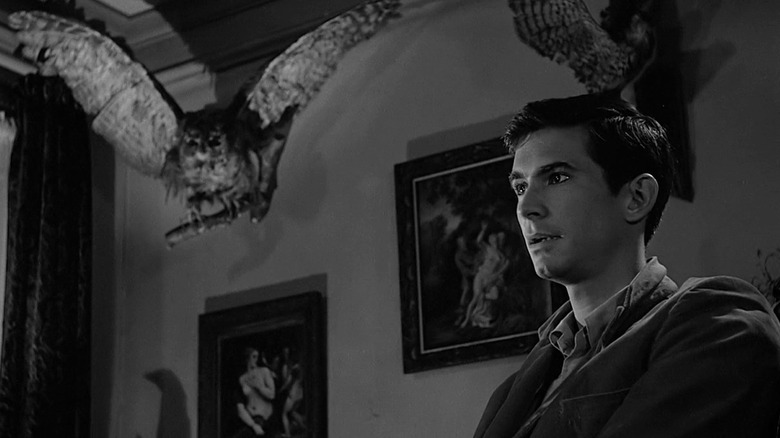How The Ending Of Psycho Was Spoiled Months Before Its Release
Alfred Hitchcock boasts a reputation for being one of the greatest filmmakers of all time, but he's also one of the earliest proponents for spoiler-alerts, and may have hated movie spoilers more than anyone else on the planet. Yes, that even includes everyone with some combination of Nolan/Snyder/Marvel/DC in their social media handles.
Hitchcock's "Psycho" is arguably the director's most iconic film, with multiple moments, reveals, and scenes becoming cultural mainstays, completely changing the fabric of how horror movies would be made moving forward. To spoil a 61-year-old film, the choice in "Psycho" to kill off leading lady Marion Crane (Janet Leigh) early in the film and then reveal that timid Norman Bates has been behind a series of brutal murders while dressed like his deceased mother were unlike anything audiences had ever seen before at the time, and Hitchcock knew the impact of these twists would be strongest if audiences couldn't see them coming. "Psycho" has a problematic legacy of putting the "killer man in a dress" trope in one of the most successful films in history, but it's also a masterfully made mystery filled with misdirections, and Hitchcock did everything in his power to keep viewing experiences completely spoiler-free.
It didn't work. But you'd be hard-pressed to find a more entertaining anti-spoiler campaign.
An Early Fight Against Spoiler Culture
One of the most notorious ways Hitchcock tried to curb spoilers was pushing the marketing taglines of "If you can't keep a secret, please stay away from people after you see 'Psycho,'" and "After you see 'Psycho,' don't give away the ending. It's the only one we have." Hitchcock also reportedly bought up as many copies as possible of Robert Bloch's source novel to keep the Marion Crane mid-film death twist under wraps. When he had personally acquired the rights to the book, he did so under a pseudonym to make sure people wouldn't run out and start buying the book in preparation for the film.
Additionally, Hitchcock made theaters establish a rule that there would be no late admittance to any screenings. "This is more than a suggestion," he told the theaters. "It is a requirement." Any late audience members, even by one minute, were not allowed to enter the theater and were given tickets to the next screening. Hitchcock turned the marketing campaign around "Psycho" into a bonafide event, and his dedication to prevent plot leaks and spoilers puts the recent boom of hashtag campaigns to shame.
Spoiler Alert: It Was Spoiled Anyway
Unfortunately, Hitchcock's efforts were spoiled by both Variety and The Hollywood Reporter writing pieces on the movie and publishing many of the top-secret moments in printed articles. Obviously people were talking about the reveals, but in an age before social media, word of mouth was impossible to spread as quickly as the printed news. Despite the availability of spoilers, people were still ecstatic to see the buzzed about film, and the film broke box-office records in Japan and the rest of Asia, France, Britain, South America, the United States, and Canada.
Fortunately for Hitchcock, the reports didn't hurt the success of "Psycho" in the slightest and the film has gone on to be one of the most beloved films in history. In 1992, the film was deemed "culturally, historically, or aesthetically significant" by the United States Library of Congress and was selected for preservation in the National Film Registry, and inspired a franchise of sequels, a popular television series, and a ridiculous amount of merchandise.


